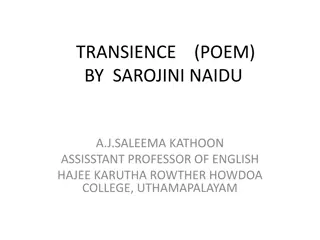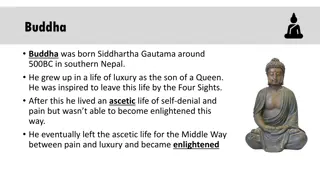Analysis of "The Flower That Smiles Today" by Percy Bysshe Shelley
This analysis delves into Percy Bysshe Shelley's poem "The Flower That Smiles Today," exploring themes of transience and impermanence in life. The author's purpose is to depict the fleeting nature of joy and beauty, urging readers to appreciate the present moment. Through poignant verses, Shelley ca
0 views • 18 slides
Transience Poem by Sarojini Naidu - Reflections on Life's Impermanence
In "Transience," Sarojini Naidu conveys a message of optimism amidst life's sorrows. Through vivid imagery, she emphasizes the impermanence of pain and the certainty of new joys and hopes. The poem reflects on the cyclical nature of life, where sorrow gives way to renewal and growth, drawing paralle
0 views • 12 slides
The Life and Teachings of Buddha
Buddha, born as Siddhartha Gautama around 500BC in Nepal, left a life of luxury to seek enlightenment after encountering the Four Sights. He eventually found enlightenment through the Middle Way, understanding the Four Noble Truths and following the Eightfold Path. His teachings on suffering, imperm
0 views • 9 slides
Analysis of Shakespeare's Sonnet "Shall I Compare Thee to a Summer's Day
Shakespeare's Sonnet 18, "Shall I Compare Thee to a Summer's Day," explores the speaker's decision not to compare their beloved to a summer day due to the impermanence of summer's beauty. Instead, the sonnet praises the eternal beauty of the beloved, highlighting the depth of emotion and admiration
0 views • 15 slides
Insights into Buddhism: The Three Marks of Reality and Four Noble Truths
Buddhism teaches about the Three Marks of Reality - impermanence, no permanent identity, and suffering, along with the Four Noble Truths - the existence, cause, end, and the path to release from suffering. These teachings offer profound insights on embracing change, letting go of attachments, and fi
0 views • 12 slides
Reflections on "Siddhartha" by the River
Siddhartha, in the chapter "By the River," experiences a profound inner journey as he contemplates life's transitory nature, reevaluates his past pursuits, and reunites with Govinda. Questioning his desires, Siddhartha realizes the impermanence of material wealth and finds a new sense of self-awaren
0 views • 11 slides
Understanding the Five Aggregates in Buddhism
Explore the concept of the Five Aggregates (Skandha) in Buddhism, which deconstructs the notion of a permanent self by breaking down personal identity into form, sensations, perception, mental formations, and consciousness. Through this lens, the impermanence and interconnectedness of all phenomena
0 views • 25 slides






